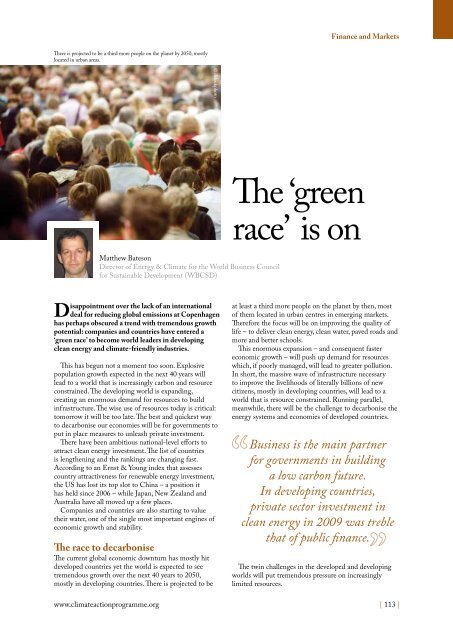Climate Action 2010-2011
Create successful ePaper yourself
Turn your PDF publications into a flip-book with our unique Google optimized e-Paper software.
Finance and Markets<br />
There is projected to be a third more people on the planet by 2050, mostly<br />
located in urban areas.<br />
© iStockphoto<br />
The ‘green<br />
race’ is on<br />
Matthew Bateson<br />
Director of Energy & <strong>Climate</strong> for the World Business Council<br />
for Sustainable Development (WBCSD)<br />
Disappointment over the lack of an international<br />
deal for reducing global emissions at Copenhagen<br />
has perhaps obscured a trend with tremendous growth<br />
potential: companies and countries have entered a<br />
‘green race’ to become world leaders in developing<br />
clean energy and climate-friendly industries.<br />
This has begun not a moment too soon. Explosive<br />
population growth expected in the next 40 years will<br />
lead to a world that is increasingly carbon and resource<br />
constrained. The developing world is expanding,<br />
creating an enormous demand for resources to build<br />
infrastructure. The wise use of resources today is critical:<br />
tomorrow it will be too late. The best and quickest way<br />
to decarbonise our economies will be for governments to<br />
put in place measures to unleash private investment.<br />
There have been ambitious national-level efforts to<br />
attract clean energy investment. The list of countries<br />
is lengthening and the rankings are changing fast.<br />
According to an Ernst & Young index that assesses<br />
country attractiveness for renewable energy investment,<br />
the US has lost its top slot to China – a position it<br />
has held since 2006 – while Japan, New Zealand and<br />
Australia have all moved up a few places.<br />
Companies and countries are also starting to value<br />
their water, one of the single most important engines of<br />
economic growth and stability.<br />
The race to decarbonise<br />
The current global economic downturn has mostly hit<br />
developed countries yet the world is expected to see<br />
tremendous growth over the next 40 years to 2050,<br />
mostly in developing countries. There is projected to be<br />
at least a third more people on the planet by then, most<br />
of them located in urban centres in emerging markets.<br />
Therefore the focus will be on improving the quality of<br />
life – to deliver clean energy, clean water, paved roads and<br />
more and better schools.<br />
This enormous expansion – and consequent faster<br />
economic growth – will push up demand for resources<br />
which, if poorly managed, will lead to greater pollution.<br />
In short, the massive wave of infrastructure necessary<br />
to improve the livelihoods of literally billions of new<br />
citizens, mostly in developing countries, will lead to a<br />
world that is resource constrained. Running parallel,<br />
meanwhile, there will be the challenge to decarbonise the<br />
energy systems and economies of developed countries.<br />
Business is the main partner<br />
for governments in building<br />
a low carbon future.<br />
In developing countries,<br />
private sector investment in<br />
clean energy in 2009 was treble<br />
that of public finance.<br />
The twin challenges in the developed and developing<br />
worlds will put tremendous pressure on increasingly<br />
limited resources.<br />
www.climateactionprogramme.org | 113 |












